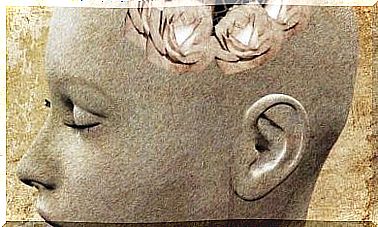Affective Deficiency Syndrome, What Is It?

The affective deficiency syndrome encompasses a set of relatively stable traits in some people and arises from the lack of affection during childhood. Childhood is a stage in which every human being is deeply vulnerable. What happens in those years leaves lasting traces that are generally manifested throughout life.
The lack of affective stimuli during childhood causes emotional development to suffer a blockage. The baby needs to be recognized through caresses, words, care and also support. When this does not happen, a fault arises and this prevents psychological evolution from following its natural course.
The affective deficiency syndrome is characterized mainly because there is a deep conviction that one is not loved. There is also an essential dissatisfaction with oneself and a deep fear of being abandoned. These traits are maintained throughout life, but they manifest differently at each age.

Signs of affective deficiency syndrome
There are some traits that are present in people who have affective deficiency syndrome. Although many people may not have felt loved, what differentiates this feeling from the syndrome itself is the stability of the symptoms.
The most common signs of the presence of affective deficiency syndrome are the following:
- Feelings of worthlessness. The person does not feel that they are worth enough; You constantly doubt your capabilities and believe that most circumstances will overwhelm your strengths or capabilities.
- Perception of failure. They often feel that they have failed miserably, even if they haven’t. There is severe self-criticism and also constant self-reproach.
- Lack of self-love. They don’t sympathize with themselves. It is difficult for them to find virtues in them and when they do, they do not take long to minimize them. They despise themselves.
- Aloofness. It is difficult for them to show what they think or feel to others, since they have an excessive fear of being rejected. Similarly, when effectively rejected, they deeply resent these situations.
- Instability. They tend to be unstable in their interpersonal relationships. They alternate attachment with abandonment.
Manifestations according to age
As we have pointed out, the affective deficiency syndrome manifests itself differently according to age. However, essential traits are present at all ages, although their expression varies according to the degree of maturity and the environment.
Taking age into account, these are the manifestations in each specific case:
- Early childhood. It corresponds to babies who cry a lot, smile little and contract infections frequently. It is common for them to have digestive problems and sometimes they do not grow enough.
- Preschool. They are apprehensive in relationships with their peers and often have some difficulty in language.
- Old school. Learning disabilities, difficulty focusing and concentrating, and feelings of worthlessness are common. The child doubts himself, refers in negative terms to what he is and has the feeling that he bothers others.
- Preadolescence and adolescence. Teens tend to be impulsive, active, and preoccupied with their appearance. They get excited very easily and addiction symptoms can appear.
- Adulthood. There is isolation, confusion in goals and objectives, as well as a frequent feeling of failure, or conformity. They fail to establish healthy relationships and limit themselves at work.

Can anything be done?
From a realistic perspective, the affective deficiency syndrome can never be fully resolved, which is not to say that it is impossible to find a way out. You can learn to live with that lack, and you can even take advantage of it. The hardest thing of all is to get started; once that step is taken, things are becoming clearer.
In these cases, the most advisable thing is a psychological therapy, with a sufficiently experienced professional. Psychodynamic therapies or psychoanalysis usually work very well in these situations. Those with affective deficiency syndrome tend to idealize their therapist and they must know how to respond to this over-expectation.
It is not easy to overcome this situation by oneself, since it is a very deep reality and it is frequent that without external support the person ends up boycotting the attempts to heal that wound that he carries inside. Either way, the approach to art, reading, meditation and sports are factors that help a lot.









